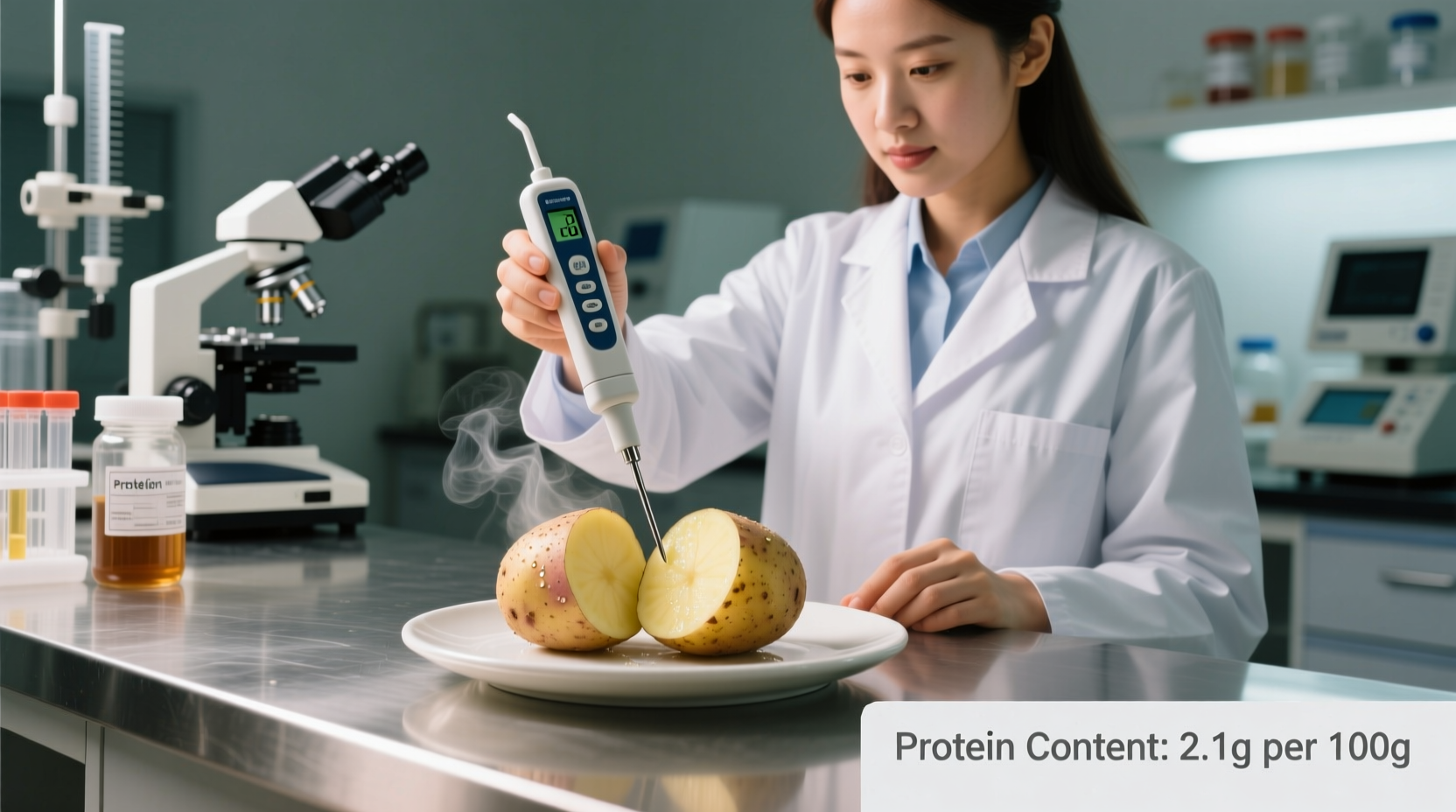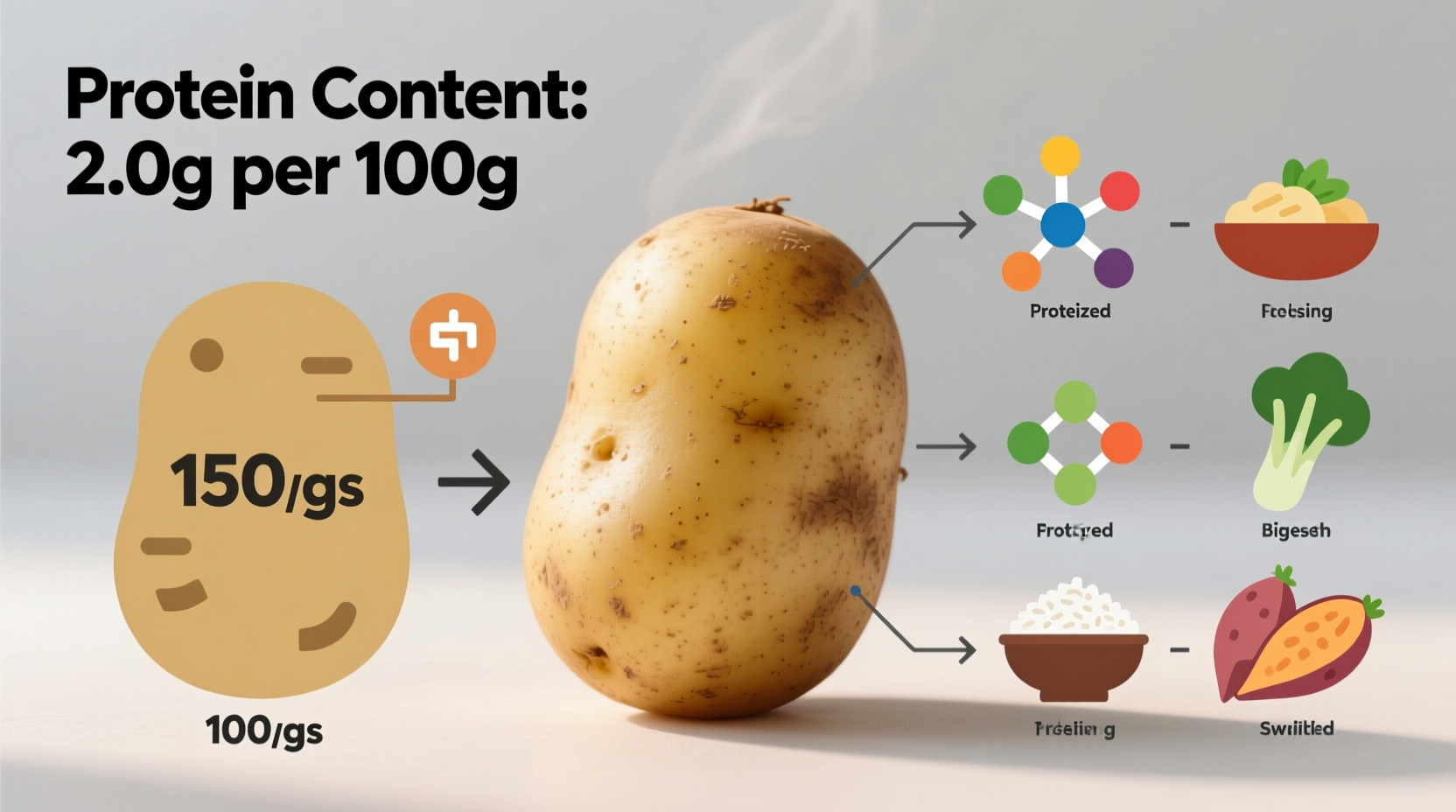When you're tracking your protein intake or planning balanced meals, understanding the exact nutritional profile of staple foods like potatoes becomes essential. This comprehensive guide delivers precise protein measurements for various potato types and preparations, backed by authoritative nutritional data sources.
Exact Protein Content in Potatoes: Size-Based Breakdown
Knowing the specific protein amount in potatoes helps with accurate meal planning. The USDA FoodData Central provides these verified measurements for raw potatoes with skin:
| Portion Size | Protein Content | % Daily Value* |
|---|---|---|
| 100g (raw) | 2.0g | 4% |
| Small potato (138g) | 2.7g | 5% |
| Medium potato (150g) | 3.0g | 6% |
| Large potato (250g) | 5.0g | 10% |
*Based on a 50g daily protein requirement for reference. Individual needs vary.
This factual对照 table demonstrates how portion size directly impacts protein intake. Unlike many assume, potato protein content remains relatively stable whether raw or cooked, with minimal loss during standard preparation methods.
How Potato Protein Compares to Other Common Foods
Understanding where potatoes stand among other protein sources puts their nutritional value in perspective. While not a high-protein food like meat or legumes, potatoes offer a meaningful contribution when consumed as part of a varied diet:
- 1 medium potato (3g protein) = 1 large egg (6g) but with additional complex carbohydrates and fiber
- 1 cup cooked lentils (18g protein) contains six times more protein than a medium potato
- Potatoes provide complete protein with all nine essential amino acids, though in lower quantities than animal sources
According to research published in the Journal of Agricultural and Food Chemistry, potato protein contains high levels of lysine, an amino acid often limited in other plant proteins. This makes potatoes particularly valuable in vegetarian and vegan meal planning when combined with grains.

Practical Applications for Your Diet
Knowing the protein facts is only valuable when applied to real-world eating patterns. Here's how to maximize potato protein in your meals:
Smart Pairing Strategies
Combine potatoes with complementary protein sources to create complete amino acid profiles:
- With legumes: Potato and bean chili provides balanced protein (try 1 potato + ½ cup black beans = 9g protein)
- With dairy: Baked potato topped with Greek yogurt (adds 15g protein per ¾ cup)
- With eggs: Hash browns with two scrambled eggs creates a 14g protein breakfast
Preparation Matters
How you cook potatoes affects their nutritional profile:
- Boiling: Minimal protein loss (about 5%) when cooked with skin intact
- Baking: Preserves nearly 100% of protein content
- Frying: Adds calories but doesn't significantly alter protein content
- Cooling: Chilled potatoes develop resistant starch, which may improve protein utilization
The Academy of Nutrition and Dietetics confirms that standard cooking methods don't substantially reduce potato protein content, making them reliable for consistent nutritional planning.
Nutritional Context: Beyond Protein Numbers
While protein content matters, potatoes offer broader nutritional benefits that enhance their dietary value:
- Rich in vitamin C (provides 30% of daily needs in one medium potato)
- Excellent source of potassium (more than a banana)
- Naturally gluten-free and easily digestible
- Contains resistant starch when cooled, supporting gut health
Registered dietitians emphasize that potatoes shouldn't be evaluated solely on protein content. Their complex carbohydrate profile provides sustained energy, while their fiber content (especially with skin) supports digestive health. For active individuals, potatoes serve as excellent pre-workout fuel that also contributes to daily protein goals.
Common Misconceptions Clarified
Several myths persist about potatoes and protein that deserve clarification:
- Myth: Potatoes are "empty calories" with no protein value
Fact: Potatoes provide meaningful protein plus essential vitamins and minerals - Myth: All the protein is in the skin
Fact: Protein is distributed throughout the potato, though skin contains additional fiber - Myth: Sweet potatoes have significantly more protein
Fact: Sweet potatoes contain slightly less protein (1.6g per 100g) than white potatoes
These clarifications come from the USDA's National Nutrient Database, which provides standardized measurements across potato varieties. Understanding these facts helps make informed dietary choices without falling for common nutritional myths.
When Potato Protein Matters Most
Certain dietary contexts make potato protein particularly valuable:
- Vegan diets: Potatoes contribute to plant-based protein goals while providing energy
- Recovery meals: The carbohydrate-protein combination supports muscle recovery
- Budget-friendly nutrition: Potatoes deliver protein at lower cost than many alternatives
- Digestive sensitivity: Easily digestible protein source for those with food intolerances
For individuals following plant-based diets, registered dietitians often recommend including potatoes as part of a diverse protein strategy. The American Journal of Clinical Nutrition notes that varied plant protein sources, including potatoes, effectively meet protein requirements when properly combined throughout the day.
Frequently Asked Questions
Do potatoes have complete protein?
Yes, potatoes contain all nine essential amino acids, making them a complete protein source, though in lower quantities than animal proteins. Combining potatoes with grains creates a more balanced amino acid profile.
How does potato protein compare to rice?
A medium potato (150g) contains about 3g protein compared to 4.2g in the same amount of cooked white rice. However, potatoes provide more potassium, vitamin C, and fiber than rice.
Does cooking method affect potato protein content?
Minimal protein loss occurs with standard cooking methods. Baking preserves nearly 100% of protein, while boiling causes about 5% loss. Frying doesn't significantly alter protein content but adds fat calories.
Which potato variety has the most protein?
Russet potatoes typically contain slightly more protein (2.5g per 100g) than red or yellow varieties (2.0g per 100g). However, differences between varieties are minimal compared to portion size impact.











 浙公网安备
33010002000092号
浙公网安备
33010002000092号 浙B2-20120091-4
浙B2-20120091-4